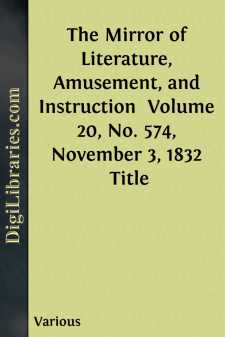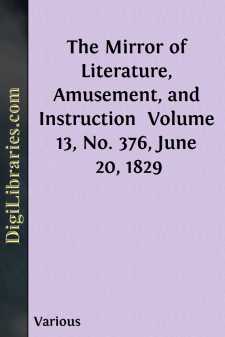Categories
- Antiques & Collectibles 13
- Architecture 36
- Art 48
- Bibles 22
- Biography & Autobiography 815
- Body, Mind & Spirit 144
- Business & Economics 28
- Children's Books 18
- Children's Fiction 14
- Computers 4
- Cooking 94
- Crafts & Hobbies 4
- Drama 346
- Education 58
- Family & Relationships 59
- Fiction 11835
- Games 19
- Gardening 17
- Health & Fitness 34
- History 1378
- House & Home 1
- Humor 147
- Juvenile Fiction 1873
- Juvenile Nonfiction 202
- Language Arts & Disciplines 89
- Law 16
- Literary Collections 686
- Literary Criticism 179
- Mathematics 13
- Medical 41
- Music 40
- Nature 180
- Non-Classifiable 1768
- Performing Arts 7
- Periodicals 1453
- Philosophy 65
- Photography 2
- Poetry 896
- Political Science 203
- Psychology 44
- Reference 154
- Religion 515
- Science 126
- Self-Help 85
- Social Science 83
- Sports & Recreation 34
- Study Aids 3
- Technology & Engineering 59
- Transportation 23
- Travel 463
- True Crime 29
Various
The author has not yet completed their profile.
Author's Books:
Sort by:
by:
Various
ACT I. The Horse Guards Parade, Elsinore, near Edinburgh. Enter MACCLAUDIUS, MACGERTRUDE, Brilliant Staff, and Scotch Guards. The Colours are trooped. Then enter TELMAH, who returns salute of Sentries. MacClaudius. I am just glad you have joined us, TELMAH. Telmah. Really! I fancied some function was going on, but thought it was a parade, in honour of my father's funeral. MacGertrude (with a...
more...
by:
Various
Abattoirs, 128Aberbrothwick. The Abbey of, 13Aboriginal Races of America. The, 151Accidents:—Fall of a Hotel in Sydney, N.S.W., 184“ “ “ Scaffold, 104“ “ St. Louis Academy of Music, 66“ “ the Roof of the Flora Hall, Hamburg, 196Agreement between Architect and Client, 30Albany Capitol. Defective Gutters on the, 97Aluminium from Bauxite, 194Alva. Statue of the Duke of, 74America. The...
more...
by:
Various
SAINTS WHO HAVE HAD BODIES. All doubtless remember the story which is told of the witty Charles II. and the Royal Society: How one day the King brought to the attention of its members a most curious and inexplicable phenomenon, which he stated thus: "When you put a trout into a pail full of water, why does not the water overflow?" The savans, naturally enough, were surprised, and suggested many...
more...
by:
Various
HANDY DICTIONARY OF POETICAL A. Abashed. Abash'd the devil stood,And felt how awful goodness is, and sawVirtue in her shape how lovely.1MILTON:Par. Lost,Bk. iv., Line 846. Abbots. To happy convents bosom'd deep in vines,Where slumber abbots purple as their wines. POPE:Dunciad,Bk. iv., Line 301. Abdication. I give this heavy weight from off my head,And this unwieldy sceptre from my hand,The...
more...
by:
Various
THE The first Comfort of Whoring, Answer'd.No sooner does a Maid arrive to Years,And she the Pleasures of Conjunction hears,But strait her Maidenhead a Tip-toe runs,To get her like, in Daughters or in Sons;Upon some jolly Lad she casts her Eye,And with some am'rous Gestures by the by;She gives him great Encouragement to takeHis fill of Love, and swears that for his sakeShe soon shall Die;...
more...
by:
Various
PROGRESS OF ANTWERP. Antwerp is now the chief port on the Continent. Since 1873 the progress has continued, and made very rapid advances. In 1883 the tonnage of the port reached 3,734,428 registered tons. This marvelous development is partly due to the position of Antwerp as the embarking point from the Continent of Europe to America, and partly also to the recent additions and changes which have been...
more...
by:
Various
INTRODUCTION In times of anxiety and discontent, when discontent has engendered the belief that great and widespread economic and social changes are needed, there is a risk that men or States may act hastily, rushing to new schemes which seem promising chiefly because they are new, catching at expedients that have a superficial air of practicality, and forgetting the general theory upon which practical...
more...
by:
Various
I. The Origin and Extent of Slavery in the Several Economic Zones of Africa Slavery in Africa has existed from time immemorial, having arisen, not from any outside influence, but from the very nature of the local conditions. The three circumstances necessary to develop slavery are: First, a country favored by the bounty of nature. Unless nature yields generously it is impossible for a subject class to...
more...
by:
Various
LYDFORD BRIDGE.Lydford Bridge. LYDFORD BRIDGE. This is an interesting scene from the wild and wonderful in Nature. Its romantic luxuriance must win the attention of the artist, and the admiration of the less wistful beholder; while the philosophic mind, unaccustomed to vulgar wonder, may seek in its formation the cause of some of the most important changes of the earth's surface. Our esteemed...
more...
by:
Various
EXETER 'CHANGE, STRAND. Who has not heard of Exeter 'Change? celebrated all over England for its menagerie and merchandize—wild beasts and cutlery—kangaroos and fleecy hosiery—elephants and minikin pins—a strange assemblage of nature and art—and savage and polished life. At page 69 of the present volume we have given a brief sketch of the "Ancient Site of the Exeter...
more...











